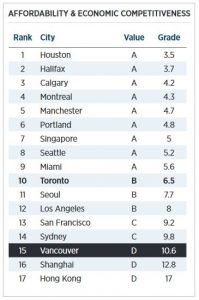One of the keys to unlocking Metro Vancouver’s housing affordability crisis is a focus on building more space for middle class families, the Greater Vancouver Board of Trade says.
 In a report issued this month, the board offered up seven suggestions for how the region could improve its “D” grade in affordability and economic competitiveness.
In a report issued this month, the board offered up seven suggestions for how the region could improve its “D” grade in affordability and economic competitiveness.
The low score was handed down by the board as part of an annual assessment of Metro Vancouver’s economic health. The scorecard highlights key issues like transit infrastructure, education and tax rates, then includes suggestions on where the board should focus its public policy efforts for the year.
The scorecard defines housing affordability as a measure of housing costs relative to income. In this case, the high cost of living in the Vancouver area means residents need to earn more to get by, but wages cannot sufficiently support the high cost of housing.
The most recent report ranked Vancouver as 15th out of 17 jurisdictions looked at by the board. Vancouver fell between Sydney, Australia, and Shanghai. Hong Kong was in last place, while Houston was in first in terms of housing affordability.
The board blames a combination of high demand, inadequate volume and a lack of diversity of housing types for the city’s soaring house prices for both buyers and renters.
It warns that unaffordability may be a disincentive for some businesses to move to Vancouver or expand operations in the area.
The report makes seven suggestions for how to improve the low grade, including collecting data on development processes and pre-zoning areas before housing development to adequately support transit routes. Details on the suggestions are available in its 19-page report.
One of the largest issues facing Vancouver residents, and therefore the report’s top suggestion for ways to improve, is the fact that the middle class has been priced out of the market.
Titled “The Missing Middle,” a section of the report suggests developers and planners base housing plans specifically on the middle class.
The board said the majority of current housing options in the city and environs are detached single family homes – which are unaffordable to those in the middle – and small condos that can’t support growing families.





